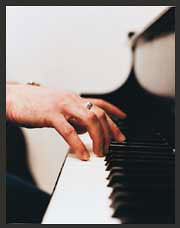
Friday, January 21, 2005
performing
Last evening I was accompanying a trio of cellists in a performance of Karl Popper's "Requiem," an odd and beautiful piece. It was one of many chamber music concerts at the school where I teach. I have a beautiful piano at home, a Steinway with a wonderful sound. Steinway pianos are capable of a huge range of color. They are harder to play than a Yamaha or Kawai or Baldwin, because one has to have a good technique to extract the sound from them; otherwise they can sound shallow or thin. But the reward for good technique is obvious. The piano I played last night was a concert grand Kawai (that is the largest size of piano, nine feet long). But it was a seriously flawed instrument, and had a hideous sound. So at the first point in the piece where I had a solo passage, I almost recoiled physical from the keys, so awful was the tone. But a professional musician should not give away such things, so I acted as if it was emitting the kinds of sound I am used to from my own piano. It was also flat in pitch, which made it very difficult for the cellists to tune. Oh well. The audience seemed to love it, anyway. That's one thing I have found: things that we musicians find troubling--bad acoustics, wrong notes, missed entrances--usually are not noticed by the audience.


Subscribe to:
Post Comments (Atom)

1 comment:
i wish that i could hear a fraction of what you heard. That would be a blessing.
Post a Comment